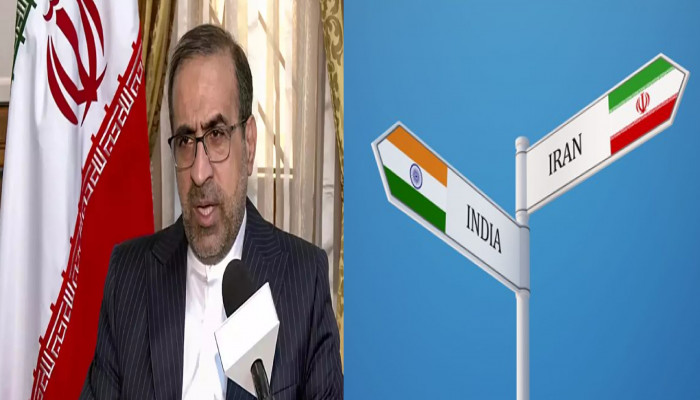Iran-India share long-standing friendship: Ambassador Iraj Elahi
- In Reports
- 03:15 PM, Feb 11, 2025
- Myind Staff
At the 46th Anniversary of the Islamic Revolution (Iran’s National Day), Iranian Ambassador to India, Iraj Elahi, highlighted the strong and historic friendship between India and Iran. He emphasised that the Persian language has played an important role in connecting both cultures.
Elahi also mentioned that the two countries work together on regional and global matters through organisations like the Shanghai Cooperation Organisation (SCO) and BRICS. He added that the recent positive meeting between Iran’s President Pezeshkian and India’s Prime Minister Modi at the BRICS summit in Russia has strengthened cooperation between the two nations. "Iran and India share a long history of friendship. The Persian language is a key cultural link between us and is recognised by the Indian government as one of India's classical languages. Both countries work together on regional and global issues, including in the SCO and BRICS. The recent positive meeting between President Pezeshkian and Prime Minister Modi at the BRICS summit in Russia has opened a new chapter of cooperation between Iran and India," he said.
Elahi emphasised the strengthening economic relationship between the two countries. "Our economic ties are growing in many fields. Last year, Iran and India signed a long-term agreement to run the Chabahar port, known as the "golden gateway" to connect nations along the Indian Ocean with Central Asia and the Caucasus. Cooperation through the International North-South Transport Corridor is another key example of the strong partnership between our countries," he added. He also thanked the attendees for joining in the celebration of the 46th anniversary of the Islamic Revolution. "I am grateful to you for accepting my invitation to join the National Day ceremony of the Islamic Republic of Iran. Tonight, we celebrate the 46th anniversary of the Islamic Revolution--a movement that brought significant changes within Iran and influenced our region and the wider world," he said.
The Iranian Ambassador further spoke about the challenges the Islamic Revolution faced adding, "From the start, this revolution encountered many challenges. Some external forces tried to slow Iran's progress in rebuilding and development. However, the Islamic Republic has continued to grow and achieve great success, thanks to the resilience and determination of the Iranian people. We have made progress in health, education, science, technology, human rights, security and defense.
Today, Iran leads in fields like nanotechnology and biotechnology. We have 3.2 million university students, and nearly half are women, demonstrating strong female participation and gender balance in higher education. The share of women and minorities in both junior and senior government positions has also increased, reflecting our policy of inclusive governance."
He added that due to government efforts, Iran's Human Development Index (HDI) has gradually improved over the previous 40 years. "Over the past four decades, our Human Development Index (HDI) has steadily improved because of government policies focused on social justice, poverty reduction, and long-term development plans. The government of the Islamic Republic of Iran is dedicated to human rights, as guaranteed by our constitution, domestic laws, and the international treaties we have signed," the Iranian envoy noted.
Elahi also highlighted Iran's advancements in science and technology, saying, "Nearly 10,000 knowledge-based companies in Iran have boosted our global standing in various technological fields. Iran is also the second Muslim country in scientific production and is a leading producer of medical isotopes for treating cancer and neurological diseases. In recent years, young Iranian scientists have launched at least 10 satellites into orbit using local expertise. These satellites demonstrate our commitment to advancing space technology and global cooperation in space exploration." Elahi stated that Iran is dedicated to safeguarding its national interests, maintaining security, strengthening economic relations and supporting regional peace.
"Iran's main foreign policy goals are to protect national interests, ensure national security and expand economic diplomacy. We support peace and stability in the region through dialogue and cooperation among neighbouring countries. Our vision is to develop balanced political, economic and cultural relations with all nations. We focus on reducing tensions, collective security, and resolving regional problems. We actively fight terrorism and oppose illegal sanctions by the United States. Our commitment is to justice, equality, peace, stability, and respect for every country's sovereignty. We have strengthened our friendly ties and communications with our neighbours and engage in regional groups such as BRICS, the Shanghai Cooperation Organisation (SCO), ECO, and D-8 to help build a stronger, more prosperous region," he said. He also reaffirmed Iran's stance on Palestine, stating, "For over 70 years, Palestinians have faced occupation and immense suffering, marked by violations of basic rights and disrespect for Muslim holy sites. Iran remains committed to supporting the rights and future of the Palestinian people."
Elahi supported Iran's nuclear program, stating that it follows international rules. "Iran's nuclear program has always been peaceful and follows international rules, with ongoing cooperation with the International Atomic Energy Agency (IAEA). We believe in negotiation and diplomacy to address any concerns about our nuclear activities. It was the United States that left the Joint Comprehensive Plan of Action (JCPOA), and European countries also failed to meet their commitments," the Iranian envoy added.







Comments